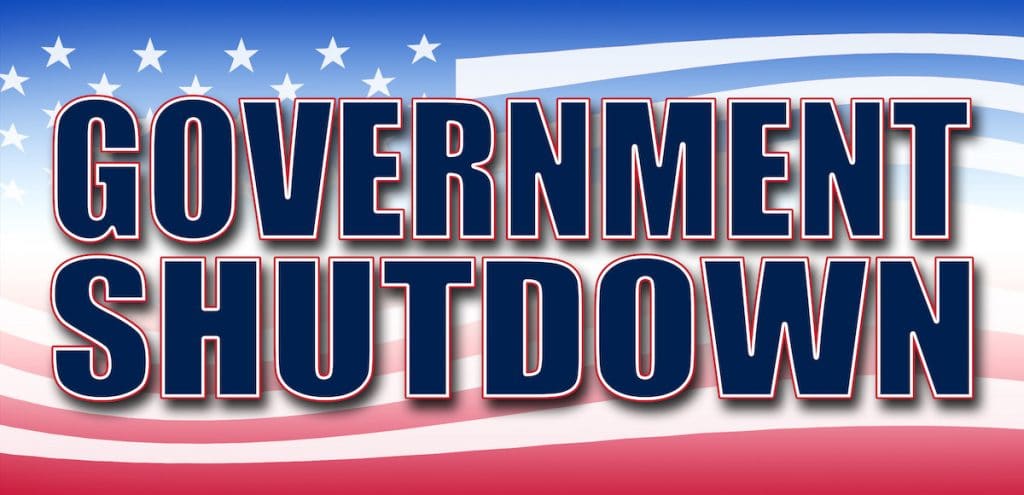

I don’t care about the current shutdown battle, but I still feel compelled to add my two cents when people make silly arguments about the economy suffering because government is temporarily spending less money.
This is actually a two-part debate.
From a microeconomic perspective, there is some genuine disruption for affected federal bureaucrats, even if they eventually will get full – and lavish – compensation for their involuntary vacations. And some federal contractors are being hit as well.
There’s also a debate about the macroeconomic impact, with some making the Keynesian argument that government spending is somehow a stimulant for the economy.
I’ve endlessly explained why Keynesian argument is bad in theory and a joke in reality.
In this interview, I tried to make a more nuanced point, explaining that we should focus more on gross domestic income (GDI), which measures how we earn our national income, rather than gross domestic product (GDP), which measures how we allocate national income.
I’m not sure I got my point across effectively in a 30-second sound bite, but it’s a point worth making since people who understand GDI are much less susceptible to the Keynesian perpetual-motion-machine argument.
But enough from me.
Harold Furchtgott-Roth, in a column for the Wall Street Journal, analyzes the potential macroeconomic consequences of the shutdown.
Does the U.S. government shutdown endanger economic growth? It has led to missed paychecks… Yet these employees represent approximately 0.5% of all American workers… The effect of the furloughs on gross domestic product is likely small. …U.S. GDP is more than $20 trillion annually, or approximately $55 billion daily. The daily compensation of furloughed federal workers is about $52.5 million, or less than 0.1% of GDP. This figure does not include affected government contractors, but even doubling or tripling this figure yields only a small share of GDP. …The net effect of the partial shutdown on direct salaries and wages will primarily be to delay, but not reduce, income for the affected families. …Maybe that’s one reason the stock market, a barometer of expectations of future economic growth, has been unperturbed by the budget impasse. The Dow and the S&P 500 are up nearly 9% since the shutdown began Dec. 22. Experience also gives reason for optimism. The last major government shutdown occurred in 1995-96. It affected the entire federal government, not only part of it. Yet U.S. GDP growth increased from 2.7% in 1995 to 3.8% in 1996.
Harold Furchtgott-Roth, The Wall Street Journal
That final sentence is key.
The Keynesians are always predicting bad consequences when there’s some sort of policy that limits government spending.
But the real-world outcome is always different, as we saw with the sequester.
Steve Malanga, writing for the City Journal, takes a microeconomic perspective on the shutdown.
I’ve seen no evidence that the shutdown will affect me and my family. I’ve heard no friend, neighbor, or relative even mention it. Virtually everyone I know outside of my professional life seems to be going about their business. Still, I’ve taken a thorough look at press coverage over the past two weeks and found nearly 500 stories on how the closure is supposed to affect our lives. …The press seems intent on convincing the rest of us that we’re at risk… Many headlines stoking fear contradict the articles they introduce. A story in the Guardian, for instance, was pitched as a tale of the shocking impact that the shutdown would have on a small rural town. Though the paper tells us the town is “in the grip of a partial government shutdown,” readers find little evidence of it. “We really haven’t noticed anything,” City Manager Mike Deal confesses. …a story in the Bangor Daily News noted that the Small Business Administration, which hands out government-subsidized loans to firms, won’t be making them during the shutdown. Still, the story notes, that’s not going to make much of a hit on the local economy, since the SBA has made just 2,687 loans in Maine since 2010, for an average of just 27 a month. …a story in the Lafayette Daily Advertiser entitled, “How the shutdown is affecting local breweries in Louisiana.” The problem, the owner of Bayou Teche Brewing explains, is that the Alcohol and Tobacco Tax and Trade Bureau is responsible for approving labels for new beers, and the agency’s not working right now. “With every government shutdown that’s happened since we opened, we’ve had a beer needing label approval,” said Karlos Knott of Bayou. “And that results in beer we’re just having to sit on.”
Steve Malanga, City Journal
Steve’s column reminds me of a piece I wrote back in 2013.
Which is why I wish one of the lessons we learned from the shutdown fight is that much of what government does is either pointless or counterproductive.
I’m not holding my breath waiting for that to happen.
Anyhow, no column on a government shutdown would be complete without some satire.
We’ll start with a sarcastic observation from Libertarian Reddit. Though it actually raises a serious point. I want to downsize Washington, but I don’t want any needless pain for bureaucrats. Yet shouldn’t we be similarly sensitive to the plight of folks in the private sector who suffer because of D.C.’s bad policies?

And it appears that government bureaucrats have figured out what to do with their hands now that they have extra time on their hands.

For what it’s worth, some bureaucrats engage in such recreation even when the government is open.






